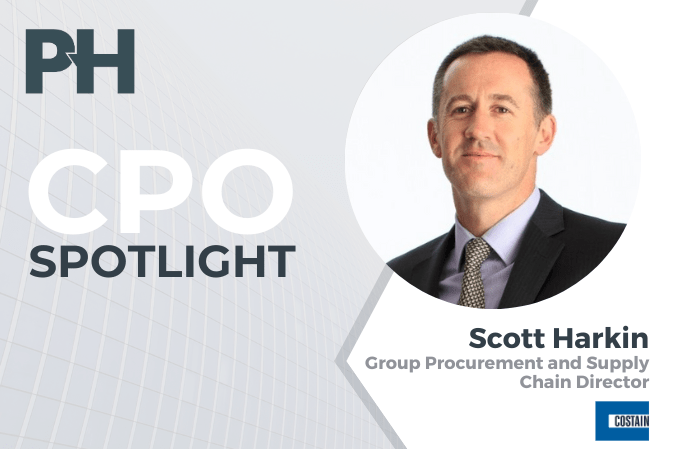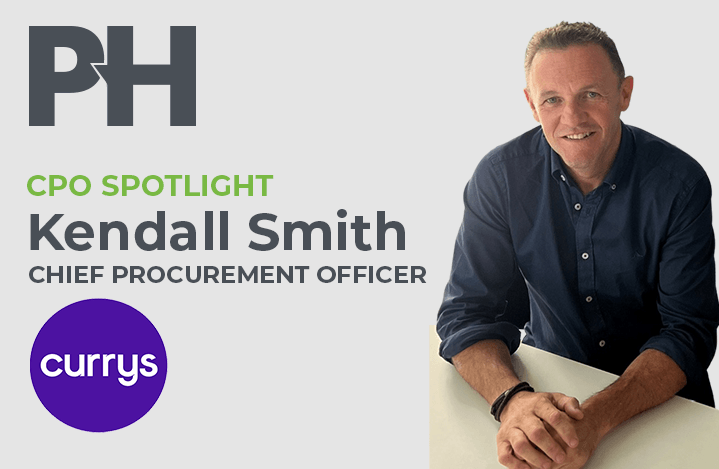CPO Spotlight, featuring Scott Harkin | Procurement Insights
Scott Harkin is Group Procurement and Supply Chain Director (CPO) at Costain. Reporting directly to the CFO, he oversees teams across all facets of a diverse and varied business. In this interview with Dan Goodson, they discuss Costain’s sustainability agenda, key characteristics in hiring people and his career in procurement.
Can you tell us about your procurement career to date?
It’s quite long now, spanning 15-20 years.
It predominantly started with my time in Australia, where I worked as a supplier quality engineer. From there, I transitioned to strategic procurement and category management, continuing my journey since then.
In the procurement and supply chain space, I haven’t only focused on procurement. I have gained broad experience across supply chain aspects, which helps me in my procurement activities because I understand the whole business.
What do you see in the supply chain side of things that has affected the business at the moment?
Fundamentally, I believe that procurement negotiations can only go so far.
How we deal with the contracts we have in place is where we continue to derive value and performance for the business. So, it’s crucial to consider the end-to-end relationship of how we interact with the business. Failing to do so means missing out on an opportunity.
What challenges do you currently face?
In this industry, similar to others, we face challenges related to cost, inflation, and materials.
As of now, I haven’t observed a people problem, but we are just starting in that space. Another aspect specific to this business is carbon emissions and sustainability.
As we are involved in construction projects, there are only certain parts we can replace to reduce carbon emissions. Doing so may involve a green tax or increased costs, but we definitely need upfront involvement from our customers to achieve significant carbon reduction. That is one of my key focus areas.
You spent a number of years in procurement leadership roles in Australia. Did procurement in Australia differ significantly from the UK?
The core procurement techniques and strategies are similar. However, there are geographical differences in Australia. If you have a nationwide business like in Australia, the consideration of geographical spend can be complex when pooling procurement. It doesn’t always make sense as it would in an all-Australian business.
Additionally, I dealt more with Asia during my time in Australia than I do here, partly due to the nature of the business. For instance, local UK defence doesn’t do business with China, whereas general manufacturing in Australia has significant involvement.
The supply chain is also different, with varying cultural understandings when dealing with low-cost country-sourcing projects and European sourcing projects. Despite these differences, the core fundamentals remain the same.
In Australia, the geographical dispersion of a core team may be more straightforward, while here in the UK, a large and diverse team brings cultural differences. Managing a multi-site, multi-business team can be easier in Australia in that respect.
What made you want to join the team at Costain?
I spent several years in defence and general manufacturing in Australia. Eventually, I realised that the market isn’t so different when you’re in a leadership role. What matters to me is people, the product, the process, and the canvas I work with.
I wanted to be in a business that makes a difference, and large infrastructure projects do just that. The main attraction for me is the greenfield role at Costain, where I have the opportunity to make my mark and create a difference in procurement and supply chain for a business of this size.
What do you see as the biggest area in which you can make significant progress?
The sustainability aspect I mentioned earlier is becoming increasingly important for businesses, including ours. We need to figure out how to incorporate sustainability commitments with our customers.
There is a significant opportunity to partner with major suppliers, so relationship management is our initial focus. Building win-win relationships with our key strategic suppliers, not just the big ones, is where we see potential.
We are actively pursuing that goal. Another important aspect is developing and articulating a clear strategy for our team. With central leadership now in place, we have the opportunity to shape our objectives and communicate them effectively to our teams and the core of the business, elevating our position within the organisation.
What are the biggest procurement challenges facing the infrastructure sector at the moment?
In my view, the biggest challenge is sustainability and how we address it as an industry. It’s too significant to be tackled by individual suppliers or industries alone.
This challenge extends beyond the common concerns of cost and inflation. Major decisions, such as delays in projects like HS2 or pausing smart motorways, impact planning and investment in the industry as a whole.
These decisions affect the entire industry and make it more difficult to build long-term relationships when the forecasts we rely on can change dramatically. We won’t find a quick solution to this challenge, but it’s something we need to collectively organise and address.
How involved is the procurement function in Costain’s sustainability commitments?
The procurement function is heavily involved, and its involvement is increasing. The supply chain represents one of our biggest opportunities. Specifically, regarding carbon emissions, our supplier base plays a crucial role in bringing forward sustainable opportunities.
Sustainability is of utmost importance to our business, and it is a significant focus area for procurement. We aim to enhance our capabilities and implement sustainable practices across our projects.
Where do you think your broader supply chain experience will add value to Costain?
I believe there is untapped value in organisations that can be unlocked by leveraging broader supply chain experience, and Costain is one such organisation.
It’s crucial to establish effective communication channels from individual projects to suppliers and to seize opportunities for improvement. Instinctively and anecdotally, I see the potential for added value, which ultimately contributes to the overall performance of the organization.
What are the key achievements you anticipate?
First and foremost, long-term planning is essential.
We need to consolidate existing pockets of long-term planning within the organisation. This will facilitate stronger partnerships with our supply chain. Additionally, delivering projects successfully, reducing waste, and optimising resource utilisation are fundamental building blocks for our business.
As an infrastructural organisation, your focus is affected by high emissions.
How do you address this challenge?
To some extent, we can address emissions. We have a large fleet, and while we do use electric vehicles in some cases, it’s not feasible to completely replace our diesel fleet due to the significant cost difference.
Reducing costs in that specific area requires customer involvement to offset the expenses. We have also been exploring innovations related to specific materials, both internally at Costain and within our supply base. These innovations sometimes do not carry a green tax, and gaining approvals for additional materials is crucial.
Being involved in projects early allows us to introduce these sustainable materials during the design phase, making it a significant focus area for us.
What advice would you give someone aspiring to achieve a procurement leadership role?
First, determine if this is something you genuinely want to pursue. As you climb the ladder, you move further away from the operational aspects of procurement.
If you truly love the hands-on work, advancing into leadership roles may not be the best path for you. It’s important to question whether you genuinely enjoy and find fulfilment in leading larger teams.
Many people assume that progressing means managing larger teams, but that may not align with personal preferences. Building a breadth of experience is also crucial. The future of leadership lies in individuals with a T-shaped or pie-shaped skill set, meaning a broad range of experience surrounding your core technical capability.
In my case, I worked in engineering, manufacturing, and operations before specialising in procurement. This diverse experience enables me to understand the pain points of the business and stakeholders, resulting in better service delivery.
Finally, don’t be hesitant if you feel you’re not entirely ready. Some skills can only be learned on the job. Embrace the opportunity and take the jump, facing your weaknesses head-on. Instead of “fake it till you make it,” I prefer “face it till you make it.”
Recognise your weaknesses, take the leap, and don’t be afraid to address those skill gaps. Sometimes people make excuses or underestimate their capabilities when, in fact, they are more than capable.
What do you look for when hiring people?
While the specific requirements vary depending on the role, my strategy primarily focuses on character and personality over skills alone.
Skills can be taught more easily than fundamental character traits. I rely on my instincts during interviews, considering whether the candidate is a good fit for the team and the role. Personal characteristics, such as how they will integrate into the team and represent us to senior stakeholders, are important considerations.
What are the key characteristics you seek in candidates?
Resilience, determination, a refusal to accept the status quo, and a mindset of continuous improvement. It’s easy for candidates to highlight their cost-saving accomplishments and strategies, but I delve deeper into how they delivered those results and overcame obstacles along the way.
How do you see the value of utilising experienced procurement professionals?
There is a place for experienced professionals, although it may not apply universally.
Project-based organisations like Costain can benefit greatly from their expertise. Maintaining a large bench of capability isn’t practical when projects conclude. Experienced professionals can help drive fundamental change during periods of transition.
While they may not be interested in a status quo organisation in the long term, their specific skill sets are invaluable during times of change. Having a core bench strength of permanent employees allows for the development of internal relationships and buy-in for future activities.
Experienced professionals do not replace permanent staff but complement them. I have successfully utilised experienced professionals in specific activities and intend to continue doing so.






